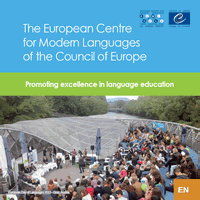Information about the ECML
 ECML information brochure: English - French
ECML information brochure: English - French
Compendium on cultural policies and trends in Europe
Initiated by the Council of Europe and the European Institute for Comparative Cultural Research (ERICarts) the Compendium is a web-based and permanently updated information and monitoring system of national cultural policies in Europe. Information is provided for 42 countries – Quick Facts, Cultural Policy Profiles, Compendium Grid in 26 national languages, Profiles of National Experts.
Common European Framework of Reference for Languages
Common European Framework of Reference: Learning, teaching, assessment, translated and published by the Ministry of Education and Science of Montenegro
Transversal themes focus on Cultural access & participation, Cultural rights and ethics, Cultural diversity, Intercultural dialogue (including the Intercultural Cities Index), Status of artists, International cultural co-operation and mobility.
Two sections provide reports on national language issues and policies (section 4.2.5) and national language laws (section 5.1.9).
European Language Portfolios
-
-
European Language Portfolio - Guide for teachers and teacher trainers
-
European Language Portfolios from other countries validated by the Council of Europe
-
The Strategic Plan of Education Reform for the period of 2005-2009 (Montenegrin and English)
Institutions and associations
Euromosaic
Euromosaic study: Support from the European Commission for measures to promote and safeguard regional or minority languages and cultures.
National relay for the European Day of Languages (EDL)
The function of a national EDL Relay is to act as a multiplier for organisations, schools and associations, circulating:
- information communicated by the Council of Europe (for example the press release of the Council on the Day, which the Relays are invited to translate into national/local languages, updates on the website);
- promotional materials - posters, stickers etc. provided by the Council of Europe every year in significant quantities for event organisers.
Contact details
EDL website
Montenegro and the Council of Europe in brief
Available in English - French - German - Italian - Russian